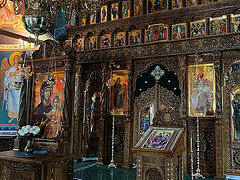The season of Great Lent is a time when we audit our souls. The Church services call us to look inward, to not remain captive to the illusions of this world—the spectacle offered to us—but to go inside ourselves, finding a state of silence and inner peace. But this is not easy and presupposes an intense struggle from the very moment we begin to tackle it.
The period of Great Lent is a time when we are called to be sincere, first of all, with ourselves. And if we are sincere with ourselves, then, of course, we will be as sincere as possible with God.
We usually deceive ourselves. Voluntarily or not, we run away from ourselves. Paradoxically, by deceiving others we deceive ourselves and twist ourselves around our little finger in the deepest dimensions of our lives. We lack the courage, the firmness of character to look inside ourselves, enter into ourselves, take an “X-ray” and see the ugliness that lives in us face to face.
If we do not have such an honest attitude towards ourselves, we cannot have an honest attitude towards God either, and our faith turns into an empty formality. Integrity is the key to authenticity. And unless we begin to change and treat ourselves differently, our understanding of faith becomes distorted.
As for how we strive to live our faith when we come to church and when we try to enter the blazing heart of the Liturgy, we, alas, do not do it the way we should. The proof that we do not understand why we come to the Liturgy, why we take Communion, why we go to confession, why we go to church services is our almost hackneyed answer: “I’m used to it.” Instead of saying: “So that I can change after coming to church, my life can be transformed, and my way of life can change according to the model suggested to us by the Church.”
I will cite just one example. We who have decided to become disciples of Christ, to follow Him and to live according to His commandments, for some reason chase after miracles. And we think that to be an eminently religious person necessarily means (in the case of saints) to work miracles. Know that this is a mistake. However, we all pursue miracles. And if at this moment you were told that in a certain monastery, say, in Bistrica Monastery, there is an elder who instantly heals people of illnesses, all of you would stop listening to me and rush there. You would leave me, because I’m not saying things that interest you. We need a spectacle.
Unfortunately, we have distorted our faith because we no longer don’t live it as we should, but according to the pattern of the modern world. We live in a society of spectacles, and this worldview is also penetrating the Church. We are becoming infected with it without knowing it. Moreover, we believe that it is natural, it is normal for faith to have a spectacular dimension. The Gospel teaches us that miracles are not wrought for believers, but for unbelievers. And no one in the Gospel expected miracles—they longed for healing, because deep in their hearts, Christ was then perceived as a Physician. This is how people then understood miracles—as healing. And now we are reducing our faith to a spectacle, and this is wrong. We think that fasting, making bows, attending the Liturgy every Sunday, reading God knows how many akathists and prayers is the essence of faith, but it is not. And if you do not believe me, I will give you as an argument one Patristic text that speaks of what the true faith means.
So, how can we live our faith and seek its essence without stopping at the externals? Of course, they are also important: they help us reveal the essence of our faith; but if we stop at them, we will become ritualists. And we can make the sign of the cross a thousand times, but, leaving the cathedral, we will remain the same as we were, slandering others with the same ease, behaving just as falsely and insincerely with our neighbors. And, ultimately, no change will come upon us.
Don’t misunderstand me: I don’t want to be overly pessimistic, but I am very worried about some points and I understand that unless we begin to live according to our faith consciously, we will not meet Christ.
 Venerable Isaac the Syrian St. Isaac the Syrian explains how to live your faith and what the essence of this life by faith is:
Venerable Isaac the Syrian St. Isaac the Syrian explains how to live your faith and what the essence of this life by faith is:
“He who see his own sins is greater than he who raises the dead with his prayer”1 (when he lives among a multitude of people).
Incredible! After all, if a person raises the dead, he is much more interesting and attractive than someone who is attentive to himself and senses his sinfulness, who is given the keen feeling that he is a dwelling-place of sin.
“He who sighs for his soul for an hour is better than the one who benefits the whole world with his speeches.”
But how is that? We live in an era of communications and we communicate in all possible and impossible ways. Then how can he who sighs for his soul for an hour be higher? But for God this is so! Because that is where change begins.
St. Isaac the Syrian continues:
“He who is made worthy to see himself is greater than he who is made worthy to see angels.”2
So, we greatly need to internalize things, not the least in today’s world where everything around us entices and captivates us in order to distract us.
There are three thoughts that I would like to reflect on. Let’s think together what we should do to truly live our faith as sincerely as possible and take the utmost care in order not to get bogged down in the externals and lose the foundation—lose what belongs to the depths of our faith. And here St. Isaac the Syrian again comes to my mind with a text surprisingly connected with prayer.
We usually meditate and pray. I concentrate and try to comprehend at least with my mind the meaning of prayer. And St. Isaac the Syrian tells us:
“Praying means nothing other than becoming a beggar, begging for the Kingdom of God. If you do this with your prayer, then you will benefit from prayer. But if you don’t, you won’t benefit.”
Only mystical, spiritual, beautiful and likeable exaltation will remain. It will bring you to a state of peace and calm, but it will remain on the fringes, without influencing the depths of spiritual life.
These are the reflections I wanted to share with you on this beautiful evening of prayer on how we should live our faith as sincerely as possible. Amen.





